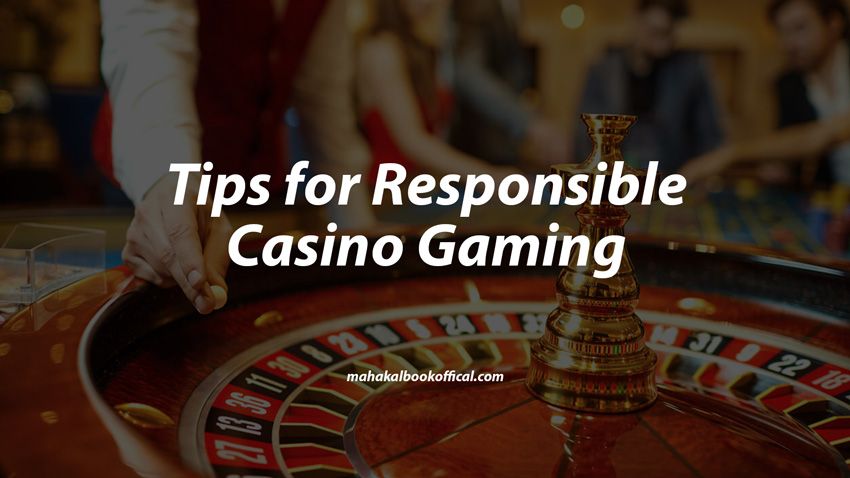Tips for Responsible Casino Gaming
Important tips to ensure you play responsibly and avoid common pitfalls in casino gaming.
 Mahakal Book Admin
Mahakal Book AdminCasino gaming can be an exciting and enjoyable activity when approached with the right mindset. However, without responsible gaming practices, it can lead to financial and emotional challenges. Whether you are a casual player or a seasoned gambler, understanding responsible gaming principles can help ensure a safe and positive experience.
In this comprehensive guide, we will cover essential tips for responsible casino gaming, including bankroll management, self-control techniques, and the importance of setting limits. We will also discuss gambling myths, the psychological aspects of betting, and how to ensure gaming remains a fun and balanced activity.
1. Understand the Nature of Gambling
Casino games are designed with a house edge, meaning that over time, the casino always has an advantage. Gambling should be viewed as a form of entertainment, not a way to make money. Accepting this reality helps you approach gaming with the right mindset and avoid unrealistic expectations.
Debunking Common Gambling Myths:
- "I’m due for a win" – Casino games operate on random chance, and past results do not influence future outcomes.
- "Certain strategies guarantee success" – While strategies can improve your play, there are no foolproof ways to beat the house in the long run.
- "Casinos manipulate the outcomes" – Licensed casinos operate under strict regulations that ensure fairness in their games.
2. Set a Gambling Budget
One of the most important responsible gaming practices is setting a budget. Determine how much money you can afford to lose without affecting your financial stability. Once you set a limit, stick to it. Never gamble with money allocated for essential expenses such as rent, bills, or savings.
How to Set a Budget:
- Decide on a fixed gambling bankroll for each session.
- Avoid increasing your budget after losses.
- Use separate accounts for gambling and daily expenses.
- Track your spending using budgeting apps or casino tracking tools.
3. Set Time Limits
Time management is just as crucial as financial management when gambling. Spending excessive hours at a casino or online gambling site can lead to compulsive behavior and poor decision-making.
Tips for Managing Playtime:
- Set alarms to remind yourself when to take breaks.
- Plan gaming sessions in advance with strict time limits.
- Balance gambling with other activities such as sports, hobbies, and socializing.
- Avoid binge gambling—spacing out sessions helps maintain control.
4. Recognize the Signs of Problem Gambling
Understanding the warning signs of problem gambling can help you or someone you know avoid serious consequences. Some common indicators include:
- Gambling with money meant for essential expenses.
- Borrowing money or selling possessions to fund gambling.
- Lying to family or friends about gambling activities.
- Chasing losses by increasing bets to recover previous losses.
- Feeling anxious, stressed, or depressed due to gambling.
Psychological Aspects of Gambling Addiction:
- Gambling can trigger dopamine release, similar to substance addiction.
- Emotional highs and lows can lead to impulsive decision-making.
- Denial is common among problem gamblers—self-awareness is key.
If you recognize these signs in yourself or others, it’s important to seek support from responsible gambling organizations or professionals.
5. Avoid Chasing Losses
Chasing losses is a common mistake where players continue betting to recover previous losses. This often leads to further losses and emotional frustration.
How to Avoid Chasing Losses:
- Accept that losses are part of the game.
- Stick to your predetermined budget and walk away when it’s exhausted.
- Take a break and return with a clear mind rather than reacting emotionally.
- Use loss limits available at online casinos to automatically stop play.
6. Use Responsible Gambling Tools
Many online casinos provide tools to promote responsible gambling. These tools can help players maintain control over their gaming habits.
Popular Responsible Gambling Tools:
- Deposit Limits: Set a cap on how much money you can deposit over a certain period.
- Time Limits: Restrict how long you can play each session.
- Self-Exclusion: Voluntarily ban yourself from gambling for a specified period.
- Reality Checks: Receive notifications about the duration of your playtime.
- Wager Limits: Prevent yourself from placing bets above a certain amount.
7. Avoid Gambling Under the Influence
Alcohol and drugs can impair judgment and lead to reckless gambling behavior. Avoid gambling while under the influence to make rational decisions and maintain self-control.
8. Take Breaks and Maintain Balance
Gambling should never consume your entire time or energy. Engage in other activities such as sports, reading, or spending time with loved ones to maintain a healthy balance in life.
Healthy Alternatives to Gambling:
- Engaging in outdoor sports or exercise.
- Learning new skills or hobbies.
- Socializing with family and friends.
- Participating in community events or volunteer work.
9. Play at Reputable Casinos
To ensure fair play and security, always choose licensed and regulated casinos. Reputable casinos provide transparent odds, responsible gambling policies, and customer support for players in need.
How to Identify a Trustworthy Casino:
- Look for licenses from regulatory authorities (e.g., UK Gambling Commission, Malta Gaming Authority).
- Check for secure payment options and data encryption.
- Read customer reviews and ratings from other players.
- Avoid offshore casinos with little to no regulation.
10. Seek Help When Needed
If you or someone you know is struggling with gambling addiction, do not hesitate to seek help. Many organizations offer support for problem gamblers and their families.
Resources for Problem Gambling Help:
- Gamblers Anonymous (GA)
- National Council on Problem Gambling (NCPG)
- BeGambleAware
- Responsible Gambling Council
- Online self-assessment tools for gambling habits
Conclusion
Responsible gaming ensures that casino gambling remains an enjoyable and controlled activity. By setting budgets, managing time, recognizing problem signs, and using responsible gambling tools, players can enjoy the thrill of gaming without negative consequences. Always remember that gambling should be a form of entertainment, not a financial strategy.
For more expert insights on responsible gambling and casino strategies, stay tuned to Mahakal Book’s blog and enjoy a safe and exciting gaming experience!




